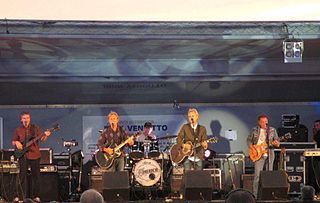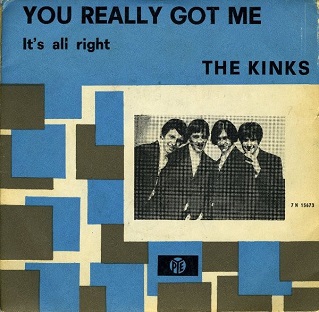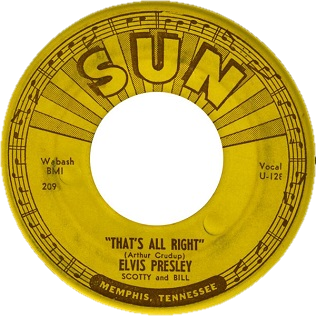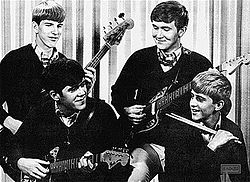Instrumental rock is rock music that emphasizes instrumental performance and features very little or no singing. Examples of instrumental music in rock can be found in practically every subgenre of the style. Instrumental rock was most popular from the mid-1950s to mid-1960s, with artists such as Bill Doggett Combo, The Fireballs, The Shadows, The Ventures, Johnny and the Hurricanes and The Spotnicks. Surf music had many instrumental songs. Many instrumental hits had roots from the R&B genre. The Allman Brothers Band feature several instrumentals. Jeff Beck also recorded two instrumental albums in the 1970s. Progressive rock and art rock performers of the late 1960s and early 1970s did many virtuosic instrumental performances.

America is an American rock band formed in London in 1970 by US artists Dewey Bunnell, Dan Peek, and Gerry Beckley. The trio met as sons of US Air Force personnel stationed in London, where they began performing live. Achieving significant popularity in the 1970s, the trio was famous for its close vocal harmonies and light acoustic folk rock sound. The band released a string of hit albums and singles, many of which found airplay on pop/soft rock stations.

Golden Earring was a Dutch rock band, founded in 1961 in The Hague as The Tornados. They achieved worldwide fame with their international hit songs "Radar Love" in 1973, which went to number one on the Dutch chart, reached the top ten in the United Kingdom, and went to number thirteen on the United States chart, "Twilight Zone" in 1982, and "When the Lady Smiles" in 1984. During their career they had nearly 30 top-ten singles on the Dutch charts and released 25 studio albums.

Heart is an American rock band formed in 1973 in Seattle, Washington. The band evolved from previous projects led by founding members Roger Fisher (guitar) and Steve Fossen, including The Army (1967–1969), Hocus Pocus (1969–1970), and White Heart (1970–1973). By 1975, original members Fisher, Fossen, and Ann Wilson, along with Nancy Wilson, Michael Derosier (drums), and Howard Leese formed the lineup for the band's initial mid- to late-1970s success period. These core members were included in the band's 2013 induction into the Rock and Roll Hall of Fame.

The Atlantics are an Australian surf band founded in 1961. Initially, the band line-up consisted of drummer Peter Hood, bassist Bosco Bosanac, Theo Penglis on lead and rhythm guitar, and guitarist Eddy Matzenik. Matzenik was replaced by Jim Skaithitis while the band was still in its earliest stages, long before the band recorded or released albums. The band's claim to fame was as Australia's most successful of the genre. Most well known for their classic hit, "Bombora", their later recordings such as "Come On" are examples of 1960s garage rock. They were the first Australian rock band to write their own hits. In 2000 the group reformed with three of the original members, and continue to release new material and perform in concert. In 2013 the group celebrated the 50th Anniversary of their first album, Bombora and the eponymous single that was their first to chart. A European tour was organised to mark the occasion.

The Hollies are an English rock and pop band formed in 1962. One of the leading British groups of the 1960s and into the mid-1970s, they are known for their distinctive three-part vocal harmony style. Allan Clarke and Graham Nash founded the band as a Merseybeat-type group in Manchester, although some of the band members came from towns further north, in east Lancashire. Nash left the group in 1968 to form Crosby, Stills & Nash, though he has reunited with the Hollies on occasion.
Orange Juice were a Scottish jangle pop band founded in the Glasgow suburb of Bearsden as the Nu-Sonics in 1976. They became Orange Juice in 1979, and became perhaps the most important band in the Scottish independent music scene that emerged in the post-punk era, inspired by contemporary punk bands including Subway Sect, Television, and Buzzcocks but also 1960s acts, most notably the Byrds and the Velvet Underground. Musically, the band brought together styles and genres that often appeared incongruous, for example, country, disco and punk.

"Walk This Way" is a song by the American rock band Aerosmith. Written by Steven Tyler and Joe Perry, the song was originally released as the second single from the album Toys in the Attic (1975). It peaked at number 10 on the Billboard Hot 100 in early 1977, part of a string of successful hit singles for the band in the 1970s. In addition to being one of the songs that helped break Aerosmith into the mainstream in the 1970s, it also helped revitalize their career in the 1980s when it was covered by hip hop group Run-D.M.C. on their 1986 album Raising Hell. This cover was a touchstone for the new musical subgenre of rap rock, or the melding of rock and hip hop. It became an international hit, reaching number 4 on the Billboard charts and becoming the first hip hop single to reach the top five on the charts, and won both groups a Soul Train Music Award for Best Rap Single in 1987 Soul Train Music Awards. Both versions are in the Grammy Hall of Fame.

"You Really Got Me" is a song by English rock band the Kinks, written by frontman Ray Davies. The song, originally performed in a more blues-orientated style, was inspired by artists such as Lead Belly and Big Bill Broonzy. Two song versions were recorded, with the second performance used for the final single. Although it was rumoured that future Led Zeppelin guitarist Jimmy Page had performed the song's guitar solo, this has been debunked.

"London Calling" is a song by the British punk rock band the Clash. It was released as a single from the band's 1979 double album of the same name. This apocalyptic, politically charged rant features the band's post-punk sound, electric guitar and vocals.

"That's All Right" is a song written and originally performed by the American blues singer Arthur Crudup and recorded in 1946. It was rereleased in early March 1949 by RCA Victor under the title "That's All Right, Mama", which was issued as RCA's first rhythm and blues record on its new 45 rpm single format.
Terry Knight and the Pack was an American garage rock band formed in Flint, Michigan in 1965. The band was signed to the Lucky Eleven label through most of its brief recording career. They produced one national hit with their cover version of the song, "I ". Despite their inability to replicate their success, the band was a frequent attraction in the Michigan rock scene. The Pack was fronted by singer Terry Knight. In 1969 the group disbanded but two members, drummer/vocalist Don Brewer and guitarist Mark Farner, would go on to form another band, Grand Funk Railroad.
Don and Dewey were an American rock, blues, and R&B duo, comprising Don "Sugarcane" Harris and Dewey Terry.
"Susie Q" is a rockabilly song co-written and performed by American musician Dale Hawkins released in 1957. The song was a commercial success, and became a classic of the early rock and roll era being recorded by many other performers in subsequent years.
"Walk, Don't Run" is an instrumental composition written and originally recorded by jazz guitarist Johnny Smith in 1954, which achieved worldwide fame when The Ventures recorded a cover version in 1960.
"California Sun" is a rock song first recorded by American rhythm and blues singer Joe Jones. Henry Glover is credited on the original 45 rpm single as the songwriter, although Roulette Records owner Morris Levy's name sometimes incorrectly appears on re-issues. In 1961, Roulette issued the song with "Please Don't Talk About Me When I'm Gone" as the B-side. The single reached number 89 on Billboard's Hot 100.

"Apache" is a song written by Jerry Lordan and first recorded by Bert Weedon. Lordan played the song on ukulele to the Shadows while on tour, and liking the song, the group released their own version which topped the UK Singles Chart for five weeks in mid-1960. The Shadows' guitarist Hank Marvin developed the song's distinctive echo and vibrato sound. After hearing the Shadows' version, Danish guitarist Jørgen Ingmann released a cover of the song in November 1960 which peaked at number 2 on the Billboard Hot 100 in the US.

"Skinny Minnie" is a 1958 song co-written and recorded by Bill Haley and his Comets. The song was released as a Decca single which became a Top 40 chart hit in the U.S.
"Farmer John" is a song written by Don "Sugarcane" Harris and Dewey Terry, and first recorded by the two as the American R&B duo Don and Dewey, in 1959. Although the original version of the composition did not receive much attention, it was reinvigorated by the garage rock band the Premiers, whose raving remake of the song was released in 1964. The song's raw and partying atmosphere was immensely popular, reaching number 19 on the Billboard Hot 100. Following the group's national success, several additional interpretations of "Farmer John" were released, making the tune a classic of garage rock.

"Surfin' U.S.A." is a song by the American rock band the Beach Boys, credited to Chuck Berry and Brian Wilson. It is a rewritten version of Berry's "Sweet Little Sixteen" set to new lyrics written by Wilson and an uncredited Mike Love. The song was released as a single on March 4, 1963, backed with "Shut Down". It was then placed as the opening track on their album of the same name.











